Unit2 Neighbours Grammar课件(共32张PPT)译林版七年级下册
文档属性
| 名称 | Unit2 Neighbours Grammar课件(共32张PPT)译林版七年级下册 |
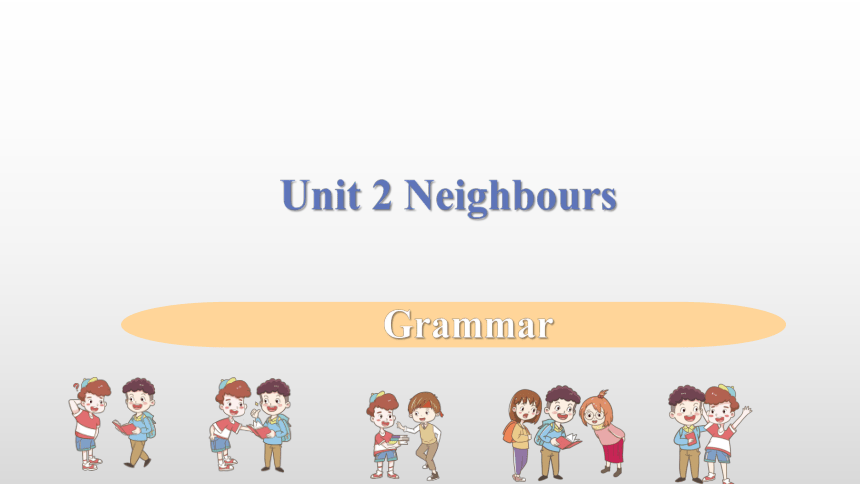
|
|
| 格式 | pptx | ||
| 文件大小 | 4.5MB | ||
| 资源类型 | 教案 | ||
| 版本资源 | 牛津译林版 | ||
| 科目 | 英语 | ||
| 更新时间 | 2024-03-25 00:00:00 | ||
图片预览

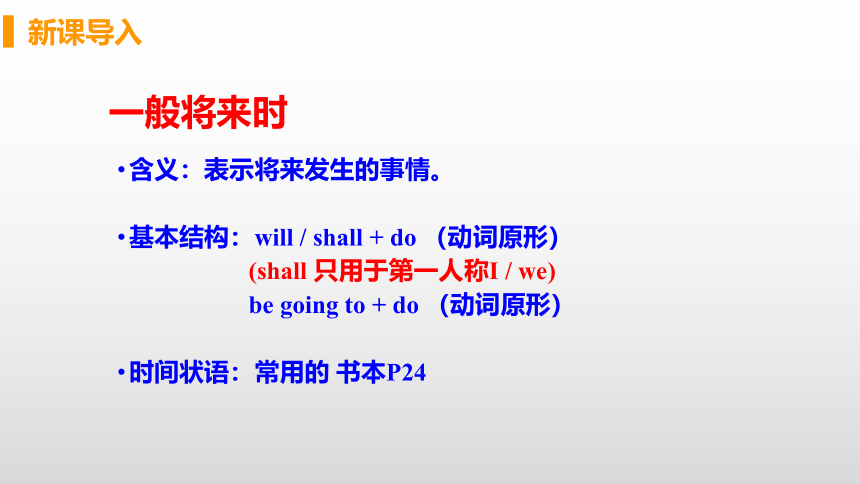

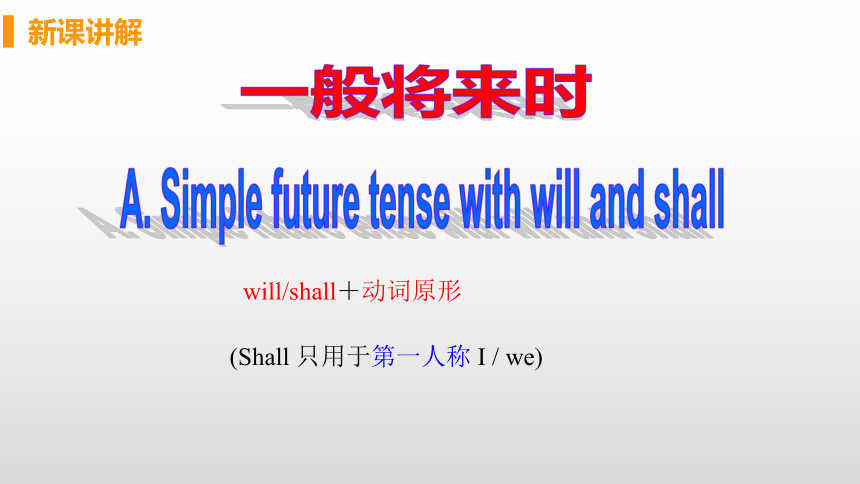

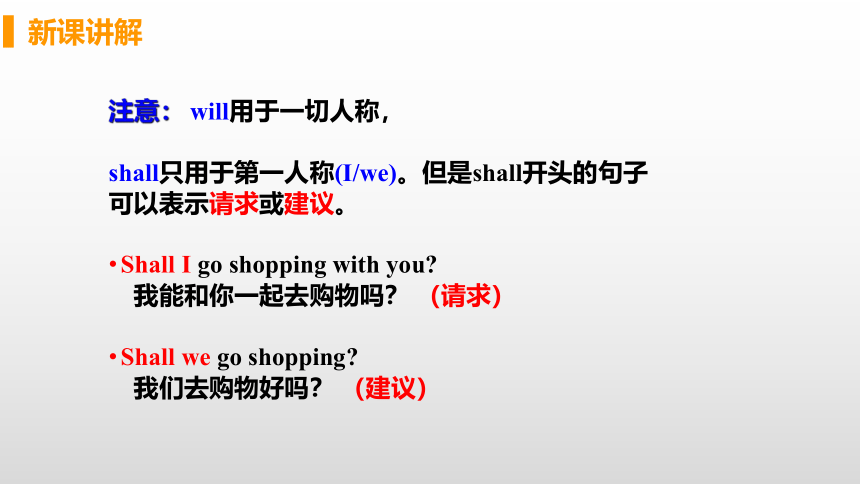
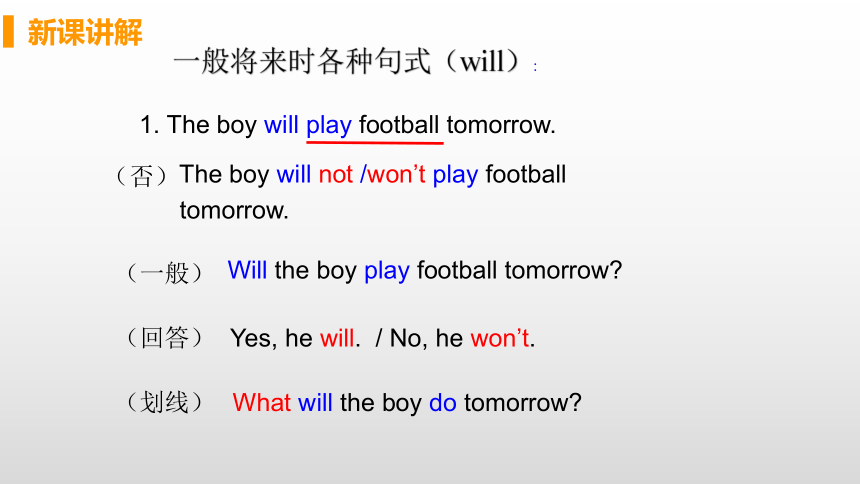
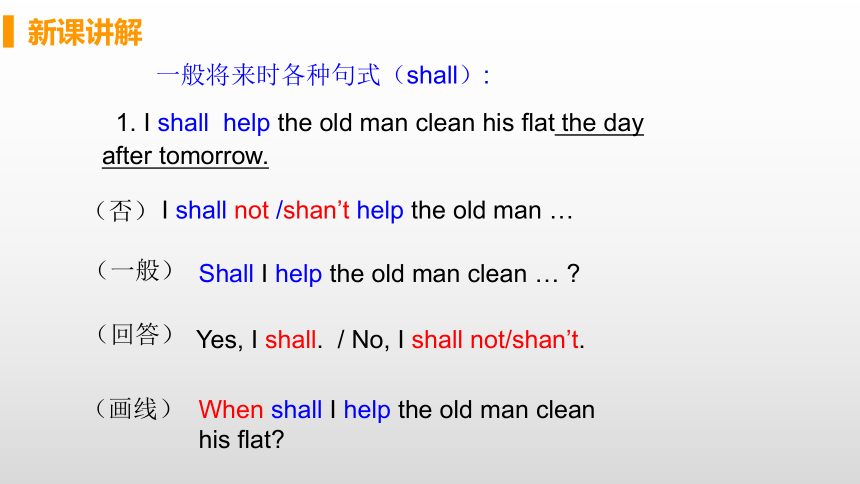

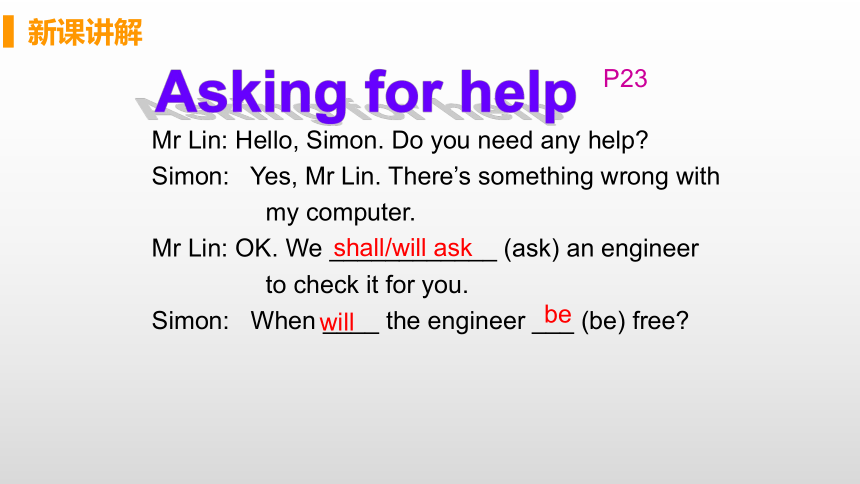
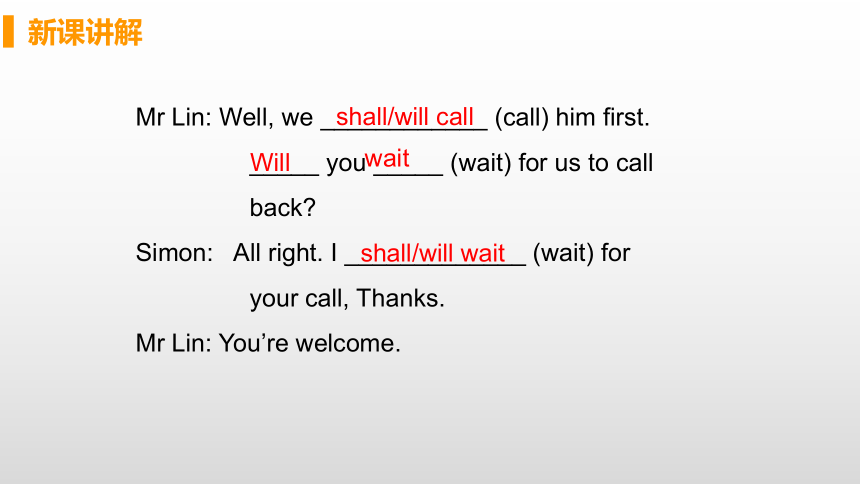
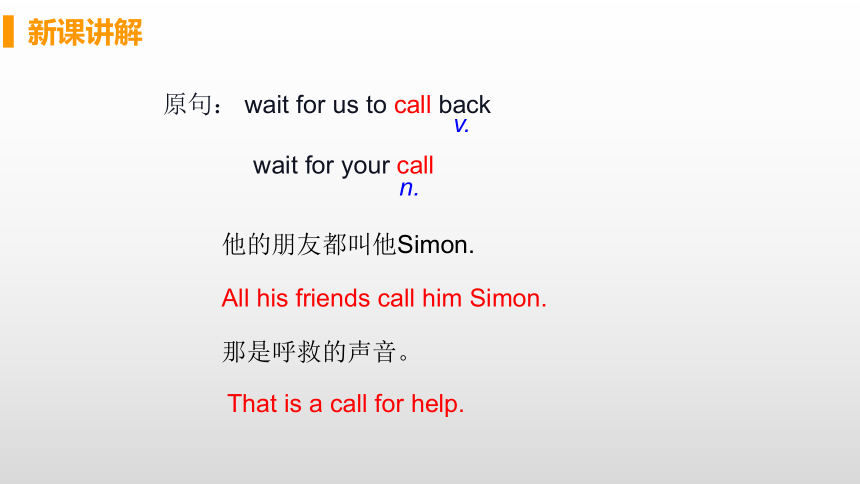
文档简介
(共32张PPT)
Unit 2 Neighbours
Grammar
新课导入
一般将来时
含义:表示将来发生的事情。
基本结构:will / shall + do (动词原形)
(shall 只用于第一人称I / we)
be going to + do (动词原形)
时间状语:常用的 书本P24
新课导入
将来时的典型标志:
next Tuesday / week / month …
tomorrow (morning/afternoon …)
this afternoon /Sunday …
tonight
the day after tomorrow
soon
in the future
今夜
不久
(在)将来
后天
* in + 一段时间
……后
in ten minutes
新课讲解
一般将来时
A. Simple future tense with will and shall
will/shall+动词原形
(Shall 只用于第一人称 I / we)
新课讲解
I will take an umbrella with me.
一般将来时: will/shall + 动词原形
1. Things that are sure to happen in the future
(将来肯定会发生的事情)
今天下午将下雨。
她奶奶下周将90岁。
It will rain this afternoon.
Her grandmother will be ninety next week.
2. plans we are making now
(我们正在做的计划)
我将随身带把伞。
新课讲解
注意: will用于一切人称,
shall只用于第一人称(I/we)。但是shall开头的句子
可以表示请求或建议。
Shall I go shopping with you
我能和你一起去购物吗? (请求)
Shall we go shopping
我们去购物好吗? (建议)
新课讲解
一般将来时各种句式(will):
1. The boy will play football tomorrow.
The boy will not /won’t play football
tomorrow.
Will the boy play football tomorrow
Yes, he will. / No, he won’t.
What will the boy do tomorrow
(否)
(一般)
(回答)
(划线)
新课讲解
一般将来时各种句式(shall):
1. I shall help the old man clean his flat the day after tomorrow.
(否)
I shall not /shan’t help the old man …
(一般)
Shall I help the old man clean …
(回答)
Yes, I shall. / No, I shall not/shan’t.
(画线)
When shall I help the old man clean his flat
新课讲解
一般将来时各种句式(shall):
1. I shall help the old man clean his flat the day after tomorrow.
(否)
I shall not /shan’t help the old man …
(一般)
Shall I help the old man clean …
(回答)
Yes, I shall. / No, I shall not/shan’t.
(画线)
When shall I help the old man clean his flat
新课讲解
Mr Lin: Hello, Simon. Do you need any help
Simon: Yes, Mr Lin. There’s something wrong with my computer.
Mr Lin: OK. We ____________ (ask) an engineer to check it for you.
Simon: When ____ the engineer ___ (be) free
shall/will ask
will
Asking for help
P23
be
新课讲解
Mr Lin: Well, we ____________ (call) him first. _____ you _____ (wait) for us to call back
Simon: All right. I _____________ (wait) for your call, Thanks.
Mr Lin: You’re welcome.
shall/will call
Will
wait
shall/will wait
新课讲解
原句: wait for us to call back
wait for your call
n.
v.
他的朋友都叫他Simon.
All his friends call him Simon.
那是呼救的声音。
That is a call for help.
当堂小练
1. Amy will do her homework tonight(今晚).
(否定句)
(一般疑问句)
(肯定、否定回答)
(对划线部分提问)
Amy won’t do her homework tonight.
Let's practise.
Will Amy do her homework tonight
Yes, she will.
/ No, she won’t.
What will Amy do tonight
句型转换
当堂小练
2. The flat will belong to(属于) Tom next year.
(否定句)
(一般疑问句)
(肯定和否定回答)
(对划线部分提问)
The flat won’t belong to Tom next year.
Will the flat belong to Tom next year
Yes, it will.
No, it will not/won’t.
Who will the flat belong to next year
当堂小练
3. Tom will find an engineer to check the computer.
(对画线部分提问)
(1)
4. My mother will carry all the food.(同上)
(1)
(2)
Who will Tom find to check the computer
What will your mother carry
Who will carry all the food
新课讲解
be going to +动词原形
B. Simple future tense with be going to
1. Things that we decide to do (决定要做的事)
I am going to visit our new neighbours.
She is going to watch the film next Friday.
2. Things that will probably happen
(很可能发生的事)
It is nine o’clock. We are going to be late.
It’s so cloudy. I think it’s going to rain.
新课讲解
be going to各种句式:
1. 肯定句:
be going to + v.原形
2. 否定句:
be + not + going to + v.原形
The boy is going to play football tomorrow.
The boy is not /isn’t going to play football tomorrow.
3. 一般疑问句:
将be置于句首。
Is the boy going to play football tomorrow
4. 一般疑问句回答:
肯定: Yes, 人称代词 + be.
Yes, he is.
否定: No, 人称代词 + be not.
No, he isn’t.
新课讲解
5. 特殊疑问句:
(1) 疑问词 + be + 主语 + going to + v.原形
What is he going to do
他打算做什么?
你打算什么时候去踢足球?
When are you going to play football
Who is going to play football
你打算去哪里踢足球?
谁打算去踢足球?
Where are you going to play football
新课讲解
Simon is telling Amy about his plan for a day out with his uncle’s family. Help him use the correct forms of be going to to talk about his plan.
Planning a day out
P24
新课讲解
Simon: Hi, Amy. My parents and I are planning a day out with my uncle’s family the day after tomorrow.
Amy: Great! What ____ you ___________ (do)
Simon: I ______________ (buy) some food, and my cousin Annie _______________ (buy) some plates and forks.
Amy: What ____ your parents __________ (do)
are
going to do
am going to buy
are
going to do
is going to buy
新课讲解
Simon: They _________________ (bring) some water.
Amy: How about your uncle
Simon: He ______________ (make) a fire.
Amy: And your aunt What ____ she ___________ (do)
Simon: She ______________ (cook) some food.
are going to bring
is going to make
is
going to do
is going to cook
新课讲解
bring 带来,从别处带到说话时所在地
take 带去,从说话人处带到别处去
你能把这些书带到教室去吗?
Can you take these books to the classroom
他会带面包来的。
He will bring some bread.
bring … here / take … there
carry 无方向性
当堂小练
We _____________________________ (take) the train to Shanghai next Friday.
Who ___________________ (sing) at the party tomorrow Millie is.
The radio says it _____________(rain) this afternoon.
4. It’s so cloudy. I think it ______________ (rain).
will take / are going to take
is going to sing
will rain
is going to rain
当堂小练
你下个周末有空吗?
Will you be free next weekend
Will you have free time next weekend
今天下午将会有一场足球比赛。
There will be a football match this afternoon.
There is going to be a football match this afternoon.
新课讲解
Pay attention to these!
在英语中,有些动词如come, go, leave,
arrive等位置移动词可用现在进行时表示将要发生的动作。如:
I’m coming. (我就来了。)
Are we all going ? (我们都将去吗 )
The train is leaving.(火车就要开了。)
当堂小练
We _______________ (meet) outside the school gate tomorrow.
2. How ____ they ___________ (visit) the History Museum next week
3. Look! They _________ (lie) on the grass.
4. He _________ (sit) on the balcony and _______ (look) out at the park at the moment.
Exercises
shall/will meet
will
visit
are lying
is sitting
looking
当堂小练
5. She is studying Chinese now.
(用 next year 改写)
6. 两天后学校里将有一场排球比赛。
She will/is going to study Chinese next year.
There will be / There is going to be
a volleyball match at school in two days.
当堂小练
1. Amy will do her homework tonight.
(否定句)
(一般疑问句)
(肯定、否定回答)
(对划线部分提问)
Amy won’t do her homework tonight.
Let's practise.
Will Amy do her homework tonight
Yes, she will.
No, she won’t.
What will Amy do tonight
句型转换:
当堂小练
2. Tom will go to London next year.
(否定句)
(一般疑问句)
(否定回答)
(对划线部分提问)
Tom won’t go to London next year.
Will Tom go to London next year
No, he will not/won’t.
Where will Tom go next year
当堂小练
3. I shall eat noodles this evening.
(1) I eat this evening
(2)
4. My mother will carry all the food.
(1)
(2)
What shall
When shall I eat noodles
What will your mother carry
Who will carry all the food
What shall
When shall I eat noodles
What will your mother carry
Who will carry all the food
当堂小练
3. I shall eat noodles this evening.
(1) I eat this evening
(2) I eat noodles
4. My mother will carry all the food.
(1) carry all the food
(2) your mother carry
What shall
When shall
Who will
What will
当堂小练
用正确的时态填空:
1. The twin brothers _______ (go) fishing next Tuesday.
2. We _____________ (meet) outside the school gate tomorrow.
3. — How ____ they ____ (visit) the History Museum next week
— By bus.
will go
will/shall meet
will visit
Unit 2 Neighbours
Grammar
新课导入
一般将来时
含义:表示将来发生的事情。
基本结构:will / shall + do (动词原形)
(shall 只用于第一人称I / we)
be going to + do (动词原形)
时间状语:常用的 书本P24
新课导入
将来时的典型标志:
next Tuesday / week / month …
tomorrow (morning/afternoon …)
this afternoon /Sunday …
tonight
the day after tomorrow
soon
in the future
今夜
不久
(在)将来
后天
* in + 一段时间
……后
in ten minutes
新课讲解
一般将来时
A. Simple future tense with will and shall
will/shall+动词原形
(Shall 只用于第一人称 I / we)
新课讲解
I will take an umbrella with me.
一般将来时: will/shall + 动词原形
1. Things that are sure to happen in the future
(将来肯定会发生的事情)
今天下午将下雨。
她奶奶下周将90岁。
It will rain this afternoon.
Her grandmother will be ninety next week.
2. plans we are making now
(我们正在做的计划)
我将随身带把伞。
新课讲解
注意: will用于一切人称,
shall只用于第一人称(I/we)。但是shall开头的句子
可以表示请求或建议。
Shall I go shopping with you
我能和你一起去购物吗? (请求)
Shall we go shopping
我们去购物好吗? (建议)
新课讲解
一般将来时各种句式(will):
1. The boy will play football tomorrow.
The boy will not /won’t play football
tomorrow.
Will the boy play football tomorrow
Yes, he will. / No, he won’t.
What will the boy do tomorrow
(否)
(一般)
(回答)
(划线)
新课讲解
一般将来时各种句式(shall):
1. I shall help the old man clean his flat the day after tomorrow.
(否)
I shall not /shan’t help the old man …
(一般)
Shall I help the old man clean …
(回答)
Yes, I shall. / No, I shall not/shan’t.
(画线)
When shall I help the old man clean his flat
新课讲解
一般将来时各种句式(shall):
1. I shall help the old man clean his flat the day after tomorrow.
(否)
I shall not /shan’t help the old man …
(一般)
Shall I help the old man clean …
(回答)
Yes, I shall. / No, I shall not/shan’t.
(画线)
When shall I help the old man clean his flat
新课讲解
Mr Lin: Hello, Simon. Do you need any help
Simon: Yes, Mr Lin. There’s something wrong with my computer.
Mr Lin: OK. We ____________ (ask) an engineer to check it for you.
Simon: When ____ the engineer ___ (be) free
shall/will ask
will
Asking for help
P23
be
新课讲解
Mr Lin: Well, we ____________ (call) him first. _____ you _____ (wait) for us to call back
Simon: All right. I _____________ (wait) for your call, Thanks.
Mr Lin: You’re welcome.
shall/will call
Will
wait
shall/will wait
新课讲解
原句: wait for us to call back
wait for your call
n.
v.
他的朋友都叫他Simon.
All his friends call him Simon.
那是呼救的声音。
That is a call for help.
当堂小练
1. Amy will do her homework tonight(今晚).
(否定句)
(一般疑问句)
(肯定、否定回答)
(对划线部分提问)
Amy won’t do her homework tonight.
Let's practise.
Will Amy do her homework tonight
Yes, she will.
/ No, she won’t.
What will Amy do tonight
句型转换
当堂小练
2. The flat will belong to(属于) Tom next year.
(否定句)
(一般疑问句)
(肯定和否定回答)
(对划线部分提问)
The flat won’t belong to Tom next year.
Will the flat belong to Tom next year
Yes, it will.
No, it will not/won’t.
Who will the flat belong to next year
当堂小练
3. Tom will find an engineer to check the computer.
(对画线部分提问)
(1)
4. My mother will carry all the food.(同上)
(1)
(2)
Who will Tom find to check the computer
What will your mother carry
Who will carry all the food
新课讲解
be going to +动词原形
B. Simple future tense with be going to
1. Things that we decide to do (决定要做的事)
I am going to visit our new neighbours.
She is going to watch the film next Friday.
2. Things that will probably happen
(很可能发生的事)
It is nine o’clock. We are going to be late.
It’s so cloudy. I think it’s going to rain.
新课讲解
be going to各种句式:
1. 肯定句:
be going to + v.原形
2. 否定句:
be + not + going to + v.原形
The boy is going to play football tomorrow.
The boy is not /isn’t going to play football tomorrow.
3. 一般疑问句:
将be置于句首。
Is the boy going to play football tomorrow
4. 一般疑问句回答:
肯定: Yes, 人称代词 + be.
Yes, he is.
否定: No, 人称代词 + be not.
No, he isn’t.
新课讲解
5. 特殊疑问句:
(1) 疑问词 + be + 主语 + going to + v.原形
What is he going to do
他打算做什么?
你打算什么时候去踢足球?
When are you going to play football
Who is going to play football
你打算去哪里踢足球?
谁打算去踢足球?
Where are you going to play football
新课讲解
Simon is telling Amy about his plan for a day out with his uncle’s family. Help him use the correct forms of be going to to talk about his plan.
Planning a day out
P24
新课讲解
Simon: Hi, Amy. My parents and I are planning a day out with my uncle’s family the day after tomorrow.
Amy: Great! What ____ you ___________ (do)
Simon: I ______________ (buy) some food, and my cousin Annie _______________ (buy) some plates and forks.
Amy: What ____ your parents __________ (do)
are
going to do
am going to buy
are
going to do
is going to buy
新课讲解
Simon: They _________________ (bring) some water.
Amy: How about your uncle
Simon: He ______________ (make) a fire.
Amy: And your aunt What ____ she ___________ (do)
Simon: She ______________ (cook) some food.
are going to bring
is going to make
is
going to do
is going to cook
新课讲解
bring 带来,从别处带到说话时所在地
take 带去,从说话人处带到别处去
你能把这些书带到教室去吗?
Can you take these books to the classroom
他会带面包来的。
He will bring some bread.
bring … here / take … there
carry 无方向性
当堂小练
We _____________________________ (take) the train to Shanghai next Friday.
Who ___________________ (sing) at the party tomorrow Millie is.
The radio says it _____________(rain) this afternoon.
4. It’s so cloudy. I think it ______________ (rain).
will take / are going to take
is going to sing
will rain
is going to rain
当堂小练
你下个周末有空吗?
Will you be free next weekend
Will you have free time next weekend
今天下午将会有一场足球比赛。
There will be a football match this afternoon.
There is going to be a football match this afternoon.
新课讲解
Pay attention to these!
在英语中,有些动词如come, go, leave,
arrive等位置移动词可用现在进行时表示将要发生的动作。如:
I’m coming. (我就来了。)
Are we all going ? (我们都将去吗 )
The train is leaving.(火车就要开了。)
当堂小练
We _______________ (meet) outside the school gate tomorrow.
2. How ____ they ___________ (visit) the History Museum next week
3. Look! They _________ (lie) on the grass.
4. He _________ (sit) on the balcony and _______ (look) out at the park at the moment.
Exercises
shall/will meet
will
visit
are lying
is sitting
looking
当堂小练
5. She is studying Chinese now.
(用 next year 改写)
6. 两天后学校里将有一场排球比赛。
She will/is going to study Chinese next year.
There will be / There is going to be
a volleyball match at school in two days.
当堂小练
1. Amy will do her homework tonight.
(否定句)
(一般疑问句)
(肯定、否定回答)
(对划线部分提问)
Amy won’t do her homework tonight.
Let's practise.
Will Amy do her homework tonight
Yes, she will.
No, she won’t.
What will Amy do tonight
句型转换:
当堂小练
2. Tom will go to London next year.
(否定句)
(一般疑问句)
(否定回答)
(对划线部分提问)
Tom won’t go to London next year.
Will Tom go to London next year
No, he will not/won’t.
Where will Tom go next year
当堂小练
3. I shall eat noodles this evening.
(1) I eat this evening
(2)
4. My mother will carry all the food.
(1)
(2)
What shall
When shall I eat noodles
What will your mother carry
Who will carry all the food
What shall
When shall I eat noodles
What will your mother carry
Who will carry all the food
当堂小练
3. I shall eat noodles this evening.
(1) I eat this evening
(2) I eat noodles
4. My mother will carry all the food.
(1) carry all the food
(2) your mother carry
What shall
When shall
Who will
What will
当堂小练
用正确的时态填空:
1. The twin brothers _______ (go) fishing next Tuesday.
2. We _____________ (meet) outside the school gate tomorrow.
3. — How ____ they ____ (visit) the History Museum next week
— By bus.
will go
will/shall meet
will visit
